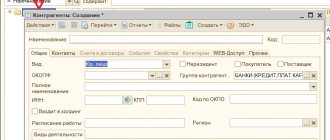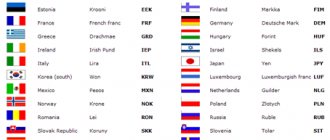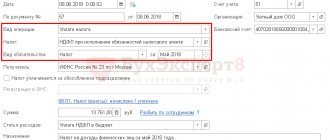Account 52 Currency accounts is intended to reflect settlements in foreign currency. Russian companies do not have the right to carry out currency transactions among themselves, with the exception of certain situations. But they can take out foreign currency loans from a bank, buy and sell foreign currency, and open foreign currency accounts in Russia and abroad.
Russian companies can pay foreign companies in foreign currency or rubles.
Cash foreign currency received from a foreign currency account can only be used for employee business trips abroad.
Currency control: legislation and basic terms
The main regulatory act that regulates currency transactions in the Russian Federation is Law No. 173-FZ dated December 10, 2003. On its basis, the Government of the Russian Federation and other government bodies adopt explanatory documents. One of the most important such regulations, which describes in detail the procedure for processing foreign exchange transactions, is the instruction of the Central Bank of the Russian Federation dated August 16, 2017 No. 181-I.
Let's look at the basic terms associated with currency control.
- Residents (legal entities) are organizations created in accordance with the legislation of the Russian Federation, as well as their branches, including those abroad. In addition, residents include the state itself, its diplomatic missions abroad, as well as federal subjects and municipalities.
- Residents (individuals) are citizens of the Russian Federation, as well as foreign citizens and stateless persons who permanently reside in the Russian Federation.
- Non-residents (legal entities) are organizations created in accordance with the legislation of other states, including their branches on the territory of the Russian Federation. Non-residents also include diplomatic missions of other countries in the Russian Federation and international organizations.
- Residents (individuals) – all foreign citizens and stateless persons, except those listed in clause 2.
- Authorized banks are Russian credit organizations that have the right to conduct foreign exchange transactions.
- Currency control authorities are structures that exercise general supervision of foreign exchange transactions and also issue regulations in this area. Today this is the Central Bank of the Russian Federation and the Government of the Russian Federation (represented by the tax and customs service).
- Currency control agents (CCA) are organizations that directly conduct currency transactions and verify their compliance with the law. In addition to authorized banks, AVK includes professional participants in the securities market and the state corporation VEB.RF.
The process of transferring money to a foreign supplier
Once the foreign currency is deposited into the bank foreign exchange account, instruct the bank to transfer the funds to the supplier. To do this you need:
- fill out an application in the prescribed form in accordance with Instruction No. 138-I of the Bank of Russia;
- fill out a certificate in the prescribed form in accordance with Instruction No. 138-I, which indicates the expected completion date and code of the type of currency transaction;
- provide documentation that justifies the payment.
Please note that if you have made an advance for goods that a foreign supplier did not deliver on time, the supplier is obliged to return the advance amount or provide an official explanation as to why there was a delay in delivery of the goods.
Why is currency control needed and what transactions does it apply to?
The state organizes foreign exchange controls to limit capital outflow and support the national currency. This procedure also makes it possible to identify various illegal tax “schemes” with the participation of foreign counterparties.
The following categories of transactions are subject to mandatory currency control:
- Between residents and non-residents. It is important to understand here that even if a Russian company pays a foreign partner in rubles, it is still a currency transaction subject to control.
- Foreign exchange transactions between residents.
- Ruble transactions between non-residents.
- Any movement of funds or securities across the state border.
Since we are talking about export-import operations from the point of view of a Russian company, we will further consider transactions related to paragraphs 1 and 4.
Money in foreign currency was transferred to the foreign currency account, posted in 1c
On the date of transfer of ownership: Debit 62 subaccount “Settlements for shipped goods (works, services)” Credit 90-1 – revenue from the sale of goods (performance of work, provision of services) is reflected; Debit 62 subaccount “Settlements for advances received” Credit 62 subaccount “Settlements for shipped goods (works, services)” – the prepayment received is credited. This posting scheme follows from paragraph 12 of PBU 9/99 and the Instructions for the chart of accounts (accounts 52, 62, 68, 76, 90). Regardless of the terms of the agreement in accounting, the organization must revaluate claims (liabilities) in foreign currency.
But determine advances issued (received) at the Bank of Russia exchange rate on the date of transfer of the prepayment and do not overestimate them in the future (clause
10 PBU 3/2006). Contents: Accounting for currency transactions in 1C 8.3 using the example of the sale and purchase of currency Attention The bank for companies opens in most cases two currency accounts - current and transit:
How banks carry out currency control
To carry out settlements with foreign partners, a Russian company must open an account in one of the authorized banks and sign a contract.
The contract, depending on its category, must indicate the exact terms of payment, delivery of goods (provision of services), return of the advance or repayment of the loan.
The procedure for a bank to carry out currency control primarily depends on the amount of the transaction. It must be converted into rubles at the exchange rate of the Central Bank of the Russian Federation on the date of signing the contract. Further, the procedure will depend on the scale of the transaction in ruble equivalent.
If the contract is small - for an amount less than 200 thousand rubles, then no documents need to be submitted to the bank. The businessman only needs to inform the credit institution of the currency transaction code (Appendix 1 to instruction No. 181-I).
For larger transactions, the order depends on the category of the transaction: export, import or loan settlements.
| Transaction amount, rub. | Export | Import/credit |
| from 200 thousand to 3 million | submit a contract to the bank | |
| from 3 million to 6 million | submit a contract to the bank | register a contract with a bank |
| over 6 million | register a contract with a bank | |
For medium-sized transactions, the businessman must provide a contract to the bank. The credit institution will determine the transaction code based on this document.
If the transaction is large (over 6 million rubles for export or over 3 million rubles for import and credit), then the bank not only takes the contract from the businessman, but also registers it, assigning a unique number.
This procedure replaced the issuance of transaction passports, which were in effect until March 2021. Exporters can register not only a finished contract, but also its draft. In this case, the document must be signed by the foreign buyer and submitted to the bank within 15 days after registration.
For all large contracts that the bank registers, the businessman must draw up a special form provided for in Appendix 6 to Instruction No. 181-I - a certificate of supporting documents (SPD).
The SPD contains a list of documents related to the execution of the contract. It indicates the amounts and timing of receipt of funds to an account in a Russian bank.
The SPD must be submitted to the bank within 15 days after the end of the month in which the transaction was executed. Depending on the category of the contract, this may be:
- For export shipments or import purchases, the month in which the declaration was issued.
- When providing services - the month in which the acceptance certificate was signed.
- When repaying a loan or advance by a foreign counterparty, the month in which the money was credited to the Russian company’s account.
Features of currency transactions
An organization that sells goods (materials, services) to foreign buyers or purchases goods (materials, services) from foreign suppliers carries out the following operations: purchase, sale, registration of a transaction in foreign currency.
For settlement transactions, the organization opens a foreign currency account in a bank. In most cases, the bank opens two foreign currency accounts for companies - current and transit:
- The current currency account is used to reflect credited foreign currency funds for the export sale of goods (materials, services);
- A transit currency account is used to execute the sale of foreign currency proceeds transferred to counterparties who are not residents of the Russian Federation in payment for goods (materials, services). After transfer, the bank transfers the balance of the currency from the transit account to the current currency account.
When conducting transactions with foreign currency, the following legislation must be taken into account:
It is important to note that foreign exchange transactions are recorded only in rubles, since foreign exchange rates are constantly changing. It is necessary to pay special attention to the date of recalculation of foreign currency into rubles. PBU 3/2006 specifies the main aspects of using account 52:
When recalculating, positive (increasing profit) or negative (decreasing profit) exchange differences may arise, which are included in non-operating expenses or income. In accounting, non-operating expenses and income are reflected in account 91 “Other income and expenses”.
Changes that came into effect in 2015 regarding the accounting of exchange rate differences in foreign exchange transactions allow the recalculation of assets and liabilities to be performed on the last date of the current month. Law of April 24, 2015 No. 81-FZ allows you to equate exchange rate differences in accounting to exchange rate differences in tax accounting.
Sanctions for violations of currency laws
Violations in the field of currency control are divided into two main categories: incorrect execution (failure to submit) of the necessary documents and non-receipt of foreign currency earnings.
Sanctions for errors in document preparation for the first violation amount to up to 5 thousand rubles. for officials and up to 50 thousand rubles. – for organizations. If the mistake is made again, the fine will increase significantly. The guilty person will have to pay up to 15 thousand rubles, and the organization – up to 150 thousand rubles. (Clause 6 and 6.4 of Article 15.25 of the Administrative Code).
The penalty for late submission of documents to the bank depends on the period of delay. Maximum fines are provided for violation of the deadline for more than 30 days: up to 5 thousand rubles. for an official and up to 50 thousand rubles. – for an organization (clause 6.3 of article 15.25 of the Administrative Code).
For violation of the deadlines for the return of foreign currency funds, the fine on the organization will be 1/150 of the key rate of the Central Bank of the Russian Federation of the amount of delay for each day. At the same time, a fixed fine in the amount of 0.75 to the full amount of non-refund may be applied. In any case, the guilty official will be fined from 20 to 30 thousand rubles. (Clause 4 and 5 of Article 15.25 of the Administrative Code).
Administrative punishment is applied for relatively “small” scale violations, amounting to up to 9 million rubles at the current exchange rate. If larger amounts are stuck abroad, then Art. 193 of the Criminal Code of the Russian Federation. The maximum sanctions under it (in aggravating circumstances) can reach a fine of 1 million rubles. and imprisonment for up to 5 years.
List of standard entries for accounting for transactions on account 52 “Currency accounts”
| Dt | CT | Wiring Description | Document |
| 57 | 51 | Transfer of the amount in rubles for the purchase of foreign currency. currencies | Bank statement |
| 52 | 57 | The amount of purchased foreign currency is reflected | |
| 57 | 52 | Foreign currency for sale listed | Bank statement |
| 51 | 57 | The proceeds from the sale of foreign currency were transferred to the ruble current account | |
| 91.02 | 57 | Negative exchange rate difference when buying (selling) is reflected | Accounting information |
| 57 | 91.02 | Positive exchange rate difference when buying (selling) is reflected | |
| 60 | 52 | Write-off of currency funds to the supplier to pay for the delivery | Bank statement |
| 66 (67) | 52 | Repayment of borrowed funds and payment of interest in foreign currency is reflected | |
| 75 (76, 79) | 52 | Transfers of foreign currency funds to other counterparties are reflected | |
| 52 | 62 | Receipt of foreign currency from buyers for goods (services) sold | |
| 52 | 66 (67) | Reflection of receipts of borrowed funds in foreign currency | |
| 52 | 75 (76,79) | Receipt of foreign currency from other counterparties | |
| 50 | 52 | Receiving currency from the bank to the cash desk | Receipt cash order |
| 71 | 50 | The issue of foreign currency to an accountable person is reflected | Account cash warrant |
| 50 | 71 | The return of unused currency funds by the accountable person to the cash desk is reflected | Receipt cash order |
| 52 | 50 | Transferring currency from the cash register to the bank | Account cash warrant |
How to avoid punishment for violating the rules of working with currency
Violations of the procedure for settlements with foreign partners will lead the company to serious losses. And in some cases, the perpetrators may even lose their freedom. Is it possible to avoid such an outcome? The simplest answer: if you do not break the law, there will be no punishment.
But not everything in such a situation depends on the goodwill of the Russian businessman. For example, a foreign partner did not pay for the goods within the period specified in the contract. But in the general case, the Russian company will still be guilty. This is the position of not only the regulatory authorities, but also the Constitutional Court (decision dated May 19, 2009 No. 572-О-О).
Punishment will not be applied only if the reason for non-fulfillment of the contract was force majeure circumstances: natural disaster, military action, etc. And the Russian side of the transaction will be responsible for the “ordinary” dishonesty of a foreign partner.
To avoid such unpleasant situations, you can use the following protection options:
- Insure the risks of non-receipt of revenue or non-receipt of imported goods for which an advance payment has been made.
- Use a bank guarantee. This service is in many ways similar to insurance, but is provided by credit institutions.
- Make payments using a letter of credit. In this case, the buyer immediately reserves funds in a special account. Therefore, the supplier can be sure that after shipment of the goods the bank will transfer him the due amount.
You can also postpone the payment deadline. But you need to sign an additional agreement to the contract and submit it to the bank before the end of the initial period.
Sale of foreign currency in 1C: Enterprise Accounting 8
Published 03/11/2021 13:51 Author: Administrator Views: 881 Selling foreign currency involves two types of account movements - debiting funds from a foreign currency account and crediting proceeds from the sale to a ruble account.
Let's consider this operation step by step, taking into account the fact that in our accounting policy we decided not to use account 57, because Currency conversion transactions take place on the same day. You can read about the preliminary settings of currency transactions and accounting policies in article 1. Let's set up the type of current accounts If you have both foreign currency and current accounts open in the same bank, then it is sometimes difficult to determine which account you have, they are like brothers.
When opening a foreign currency account, the bank also automatically opens a transit account; it is intended for crediting foreign currency earnings from foreign counterparties. To make it easier to distinguish accounts from each other, I recommend doing the following: Go to the “Main” section - “Organization details”.
Posting a currency transfer from a transit account to a current account
Foreign exchange transactions with residents are prohibited, except for specially provided cases (subparagraph “a”, paragraph 9, part 1, article 1, article 9 of the Law of December 10, 2003 No. 173-FZ). For more information about this, see What foreign exchange transactions can be carried out by Russian organizations.
Convert the funds received in foreign currency into rubles at the official rate of the Bank of Russia established on the date of their crediting to the organization’s transit currency account (paragraph 1, clause 5 of PBU 3/2006). At the same time, make an entry in the foreign currency accounting registers.
This follows from paragraph 24 of the Regulations on Accounting and Reporting. Accounting for the receipt of foreign currency earnings depends on the terms of the agreement.
In particular, from:
- on what date is ownership of the goods transferred or when the work (services) are considered accepted by the customer (on the date of shipment, the date of signing the act, the date of payment, the date of registration of the customs declaration, etc.);
- Does the contract provide for prepayment?
If title passes on the date of shipment (a date other than the date of payment) and the contract provides for subsequent payment, make the following entries.
On the date of transfer of ownership: Debit 62 Credit 90-1 – revenue from the sale of goods is reflected.
On the date of payment: Debit 52 subaccount “Transit currency account” Credit 62 – payment by the buyer for the goods is reflected; Debit 52 sub-account “Current foreign exchange account” Credit 52 sub-account “Transit foreign currency account” – currency is transferred to the current foreign currency account.
Transfer of funds from transit to current
- sold for Russian rubles;
- transferred to the current account.
Important
Consequently, a transit currency account is intended for the receipt of money, but not for its accumulation and storage. It is also necessary to emphasize that the transfer from a transit account to a foreign currency account is not carried out automatically.
To carry out such actions, the resident must confirm and justify the amounts received and send to the authorized credit institution:
- an order to transfer money to a current account;
- a certificate identifying the foreign currency earnings received to the transit foreign currency account;
- documents that are the basis for receiving amounts.
Accounting entries To summarize the description of the transit account, we should dwell on the entries associated with transactions on it.
Transfer of currency from a transit account to a current transaction
Attention
To calculate exchange rate differences on funds in a foreign currency account, the accountant issued certificates for January 31 and February 1. An example of reflecting in accounting an operation for the sale of goods for export.
Payments are made in foreign currency. The contract provides for the transfer of ownership of the goods after shipment. Payment is made after shipment. Alpha LLC has entered into a foreign trade contract for the supply of goods. Contract amount – USD 10,000 (VAT – 0%). According to the terms of the contract, ownership passes to the buyer upon shipment. On January 28, Alpha shipped goods for export. The cost of goods sold is RUB 230,000. On February 1, the buyer will pay in full for the goods.
N 33n); D-t account 57 (91) - K-t 91 (57) - exchange rate difference on account 57, which arose in connection with a change in the current exchange rate of the ruble to foreign currency, is reflected in non-operating income (expenses); D- t of account 91 (57) - Kt of account 57 (91) - the financial result from the sale of currency is identified, determined as the difference between the rate of sale of currency and the rate of the Central Bank of the Russian Federation established on the date of sale. The portion of foreign currency earnings remaining at the organization’s disposal is transferred from the transit currency account to the current currency account, which is reflected by the posting: D-t account 52 / “Current foreign exchange account” - K-t account 52 / “Transit foreign currency account”.
For profit tax purposes, income and expenses identified during the sale of foreign currency will be taken into account in full according to accounting data.
- 1 Purchasing currency
- 2 Accounting for foreign exchange earnings
Russian organizations can conduct currency transactions that do not contradict currency legislation (Law No. 173-FZ of December 10, 2003). In its activities, an organization can:
- purchase foreign currency;
- receive foreign exchange earnings from the sale of goods (performance of work, provision of services);
- receive loans (credits) in foreign currency.
Accounting for foreign exchange transactions is carried out on the basis of PBU 3/2006 and the Chart of Accounts and Instructions for its application.
To summarize information on the availability and movement of foreign currency in foreign currency accounts opened in authorized banks in Russia or in banks outside its borders, account 52 “Currency accounts” is intended.
You can open sub-accounts for account 52 - “Currency accounts within the country”, “Currency accounts abroad”.
This procedure follows from paragraph 12 of PBU 9/99 and the Instructions for the chart of accounts (accounts 52, 62, 90-1). If the agreement provides for an advance payment, the advance received is not recognized as income of the organization and is reflected in accounts payable (clause
3 and 12
PBU 9/99). Record the receipt of foreign currency earnings in this case as follows. On the date of payment: Debit 52 sub-account “Transit currency account” Credit 62 sub-account “Settlements on advances received” - an advance payment was received in foreign currency; Debit 52 sub-account “Current foreign exchange account” Credit 52 sub-account “Transit foreign currency account” – currency is transferred to the current foreign currency account.
PBU 9/99). Most banks will have to pay a commission to purchase foreign currency. In accounting, include this amount as part of other expenses (paragraph 7, paragraph 11 of PBU 10/99). An example of reflecting in accounting a transaction for the purchase of foreign currency. Alpha LLC entered into a foreign trade contract.
To execute it, Alpha needs US dollars. There is no money in the organization's foreign currency account. Therefore, on January 30, Alpha instructed the bank to purchase the necessary currency ($1,000). To do this, we drew up a settlement document and transferred 31,000 rubles to purchase foreign currency.
On February 2, the bank bought foreign currency at the rate of 30.50 rubles. per dollar and credited it to the organization’s foreign currency account minus a commission in the amount of 200 rubles. The US dollar exchange rate on February 2 (conditionally) was 29.70 rubles. for a dollar. The organization's accountant made the following entries in the accounting records.
January 30: Debit 57 Credit 51–31,000 rub.
T. KRUTYAKOVAAKDI “Economy and Life” In the accounting of organizations, the receipt of foreign currency earnings is reflected by the posting: D-t account 52 / “Transit currency account” - K-t account 62 - foreign currency earnings were received in the transit currency account.
Transactions on the sale of foreign currency earnings (both mandatory and voluntary) are reflected in accounting using account 57 “Transfers in transit”: D-t of account 57 - K-t of account 52 / “Transit currency account” - foreign currency funds subject to sales; D-t of account 51 - K-t of account 57 - funds from the sale of currency were credited to the current account; D-t of account 91 - K-t of account 57 (51) - commission to the bank in connection with the sale of currency is reflected in operating expenses (p.
11 Accounting Regulations “Organization Expenses” PBU 10/99, approved by Order of the Ministry of Finance of Russia dated May 6, 1999. Make the revaluation as of the date:
- reporting date (on the last day of each month).
In addition, the accounting policy for accounting purposes can prescribe the procedure for revaluing foreign currency as the exchange rate changes. This is provided for in paragraphs 7, 9–10 of PBU 3/2006, paragraph 7 of PBU 1/2008.
When revaluing, exchange rate differences arise:
- positive - if the exchange rate to the ruble on the date of revaluation is higher than on the date of initial accounting of foreign currency;
- negative – if the exchange rate against the ruble falls.
This follows from paragraph 4 of paragraph 3 and paragraph 11 of PBU 3/2006. It is advisable to formalize the calculation of exchange rate differences in the form of an accounting statement drawn up in any form.
Take into account positive exchange rate differences as part of other income (clause 7 of PBU 9/99). Negative exchange rate differences – in other expenses (p.
Source: https://vip-real-estate.ru/2021/05/03/provodka-perevoda-valyuty-s-tranzitnogo-scheta-na-tekushhij/
Accounting nuances
A foreign currency account has accounting features. For example, all transactions are reflected in accounting based on:
1. Bank statements.
2. Cash settlement documents attached to them.
Analytical accounting for foreign currency accounts is maintained for each account opened for storing funds in foreign currency.
By the way, you can open the following subaccounts to a foreign currency account:
- 52-1 “Currency accounts within the country”;
- 52-2 “Currency accounts abroad.”
Regulatory regulation of foreign exchange transactions
Regulatory regulation of accounting for settlements under account 52 “Currency accounts” is defined:
- Federal Law “On Accounting” No. 402-FZ dated December 6, 2011;
- Chart of accounts and instructions for its use, approved by the Ministry of Finance of the Russian Federation, order No. 94n dated October 31, 2000;
- Civil Code of the Russian Federation;
- Federal Law No. 173-FZ of December 10, 2003 “On currency regulation and currency control.”
- Instruction of the Bank of Russia dated May 30, 2014 N 153-I (as amended on December 24, 2018) “On opening and closing bank accounts, deposit accounts, and deposit accounts”;
- Regulation of the Bank of Russia dated June 19, 2012 N 383-P (as amended on October 11, 2018) “On the rules for transferring funds”, etc.





